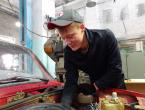Yekaterinburg Polytechnic, Yekaterinburg, Sverdlovsk Region. Modernity: successes and achievements
Pages of history
Technical school №6. Building on Griboedova, 9
The date of birth of our educational institution can rightly be considered September 1, 1954, and the place of birth is the city of Sverdlovsk, st. Griboyedov 9 and then it was called Technical School No. 6.
The school was opened to train personnel for the chemical industry in the city of Sverdlovsk and the Sverdlovsk region. The first director was Zamedyansky Grigory Kuzmich
Since 1965, students and masters of our lyceum have begun close cooperation with the collective farm named after Ya.M. Sverdlov. If we calculate the area of potato fields, then it will be equal to 3 equators.

View of the main building, Korotky lane, 1
In 1967, our educational institution moved to a new building, at the address Sverdlovsk, per. Short, 1, where it is now, only the trees have become much taller ...
Several large enterprises of the city help to construct this building: the Tire Plant, Rubber Products, Medications, and a factory of ebonite products. 1 million 300 thousand rubles were spent on the construction of this building.
And in 1972 our educational institution again changed its name and was called Technical School No. 2.
The next milestone in the history of the development of our lyceum is 1984-1993. At this time, we again change our name: from a technical school we are renamed into a secondary vocational technical school.

The main building of the Polytechnic. Our days
At this time, preparation for the release of students with secondary education begins, a new specialty opens - a welder. And all these innovations are due to the director who worked with the team from 1990 - 2000, Nikolai Ivanovich Kozlov
In 1994, the secondary vocational technical school was awarded the status of the Vocational Lyceum. Our students are reaching a new level - the level of research professional activity.
In 2006, our educational institution was assigned the status of a technical school and the name was changed again - Yekaterinburg Polytechnic.
Currently, the full name of our educational sound long and proudly: state budgetary educational institution of secondary vocational education of the Sverdlovsk region "Yekaterinburg Polytechnic"
Modernity: successes and achievements
GBOU SPO SO "Yekaterinburg Polytechnic" is an educational institution operating in the development mode.
The innovative activity of teachers and students is embodied in a variety of project activities. Projects are systematically implemented, both at the level of an educational institution and at the level of individual teachers.
The projects implemented by the technical school have a different focus: improving the quality of training specialists, improving the management system, optimizing the educational process, etc.
2004 Project for the creation of the information environment of the technical school
Since 2002, the technical school (then still a professional lyceum) has been working on the project "Creation of the information environment of the submarine №68 as a condition for the successful functioning of educational institutions at the present stage", which received I place at the scientific-practical conference "Information technologies in the education system of the Sverdlovsk region" in 2003- In 2004, within the framework of this project, the teachers of the Lyceum also received prizes at conferences in 2001-2002, 2002-2003.
The purpose of this project is the use of information technology in Vocational Lyceum No. 68 to optimize the process of managing the Lyceum, improve the quality of education and social adaptation of students.
The tasks were set - informatization of the management process, automation of lyceum services, information support of the educational process.
Within the framework of the project, the electronic databases Name Book, Tariffication and accounting of debtors, Certification and monitoring, Industrial practice, Automated system of accounting and control of hours according to the schedule have been created and are successfully used.
The results of the project were the creation of a modern information educational environment in the technical school and advanced training of teachers in the field of information and communication technologies.
2005 IT as a means of ensuring the competitiveness of a graduate
The project "Information Technologies as a Means of Forming a Competitive Graduate" received the II place in the competition for a grant from the Ministry of General and Professional Education of the Sverdlovsk Region in 2005 and a grant in the amount of 300 thousand. rubles.
The project presents technologies, methods of work that create conditions for the development of an independent, thinking, creative personality, a professional specialist. The project describes the specific results of work in the form of computer support for various subjects, programs, tests, as well as those qualities that are planned to be obtained from the graduates of the lyceum. An automated program for monitoring the educational process helps to track the results of the project.
Tasks set for the implementation of the project:
- creation of conditions for the formation of professional competence of students, the development of information and communication culture of teachers and students;
- information support of the educational process, including educational, industrial, extracurricular activities;
- development of the material and technical base that ensures the use of IT in the educational process of educational institutions (Creation of classes with computer equipment, connection to the Internet).
During the implementation of the project, the software and educational-methodological support of subjects and professions became much more diverse, the forms and methods of work with the use of multimedia technology began to be used more widely:
- educational - methodical projects
- electronic textbooks
- electronic teaching aids for students
- computer tests
- electronic didactic units
- computer simulators
- automated rating system
- automated monitoring of the educational process
The implementation of this project contributed to an increase in the quality of education of lyceum graduates, an increase in their competitiveness in the labor market, and an increase in the prestige of an educational institution.
There was a development of the material and technical base of the educational institution.
Internet connection.
Installation of stationary computers in the methodological center, library, master's room, history classrooms, special disciplines of the “Accountant” profession.
Also, a cabinet of humanitarian disciplines was created, equipped with a multimedia complex, in which the teachers of the lyceum began to conduct lessons, class hours.
2006 Integration of the levels of NGO and open source software. Obtaining the status of a technical school
The project "Implementation of integrated educational programs of primary and secondary vocational education as a condition for the effective functioning of an educational institution in modern socio-economic conditions"
The project outlines approaches to reorganizing the lyceum into a multi-level institution of secondary vocational education. The results of the work that contribute to the fulfillment of the main mission of the educational institution - to provide affordable high-quality education, creating conditions for the formation of a competitive specialist - are prescribed.
Analysis of the situation on the labor market and the market of educational services allows us to conclude that there is a need for specialists who combine good professional skills and are capable of working on complex equipment. In addition, enterprises need specialists with qualifications that are in demand in a specific production, trained in a short time. Such specialists can be trained by an educational institution built on the basis of a multi-level training structure based on the principles of integrating primary and secondary vocational education. The implementation of integrated educational programs for NGOs and SPE will allow:
- to increase the prestige of the professions of NGOs;
- to provide the opportunity for students to receive continuous education within the framework of one educational institution;
- expand the range of educational services and access to multilevel education;
- to increase social security and their competitiveness in the labor market;
- to increase the attractiveness of the educational institution among school graduates. It is advisable to build a continuous education chain so that students have the opportunity to graduate and enter at any level of vocational education;
- create optimal conditions for meeting the educational needs of the adult population.
The goal of the project: to create conditions for the effective work of educational institutions in the current socio-economic situation, namely, to create a multi-level multidisciplinary educational institution capable of implementing multi-level educational programs in order to meet the requirements of employers, overcome the negative demographic situation, increase the competitiveness of educational institutions in the educational services market, increasing the demand for graduates in the labor market and their best adaptation in society.
The tasks to be solved by the project:
- creation of conditions for ensuring an increased level of professional education, the formation of competitive graduates in the labor market, increasing their social security; fulfillment of budgetary obligations, taking into account the needs of the regional labor market;
- development of the material and technical base of the lyceum;
- meeting the requirements of social partners for the formation of a specialist capable of analyzing and designing his activities, independent actions in conditions of uncertainty, solving problems in the field of professional activity, ready for continuous professional growth, capable of learning throughout his life;
- providing a choice of educational trajectory to applicants (schoolchildren and adults) to meet the demand for educational services.
Integration of primary and secondary vocational education within the walls of one educational institution is one of the promising directions in the restructuring of the network of educational institutions in the region. Such a multidisciplinary multi-level educational institution is a new form of continuous professional education, built on the interaction of educational and professional spaces. The project presents a comprehensive model of a multi-level multidisciplinary educational institution, which consists of a model of the educational space, management structure, conditions for the development of educational programs, structures for the preparation and implementation of NGO-SPE programs.
OU is integrated with the production area
The educational institution is built on the basis of a competence-based approach
OU is open to all groups of the city's population
Such a training structure provides an opportunity to build a variety of individual learning paths, helps to combine the best from the systems of primary and secondary vocational education.
2007 Innovative educational program "Modular training of specialists"
Innovative educational program "Modular training of specialists for the maintenance, adjustment and repair of high-performance automated equipment in mechanical engineering"
The innovative educational program (hereinafter IEP) was presented in 2007 within the framework of the national project "Education" for the competition for the selection of state educational institutions of primary vocational and secondary vocational education, introducing innovative educational programs, for state support for the training of workers and specialists for high-tech industries, and Yekaterinburg Polytechnic became one of the winners, having received total funding in the amount of 40 million rubles.
IEP "Modular training of specialists for the maintenance, adjustment and repair of high-performance automated equipment in mechanical engineering" covers the profiles of Optical Manufacturing and Metalworking, educational programs for professional training "Operator of programmed machine tools" mechanic "," Locksmith - repairman ", secondary vocational education, specialty" Automation of technological processes and production. "
The co-investors of the project are the Ural Machine-Building Corporation "Pumori-Sverdlovsk Instrumental Plant" and the Federal State Unitary Enterprise "Ural Optical and Mechanical Plant".
The modernization of production at enterprises leads to the emergence of complex multi-operational equipment (hereinafter referred to as the "center") that performs several technological operations. For example, at UMK "PUMORI-SIZ" modern high-performance automated equipment makes up more than 20% of the machine tool park, at FSUE PO "UOMZ" -5%
The employer forms qualitatively different requirements for the professional qualifications of employees, including the competencies of different qualifications at the modern level.
For example, for FGUP PO "UOMZ" it is the competence of an optician-mechanic, since the equipment is used for the production of optoelectronic devices, for UMK "Pumori-SIZ" it is the competence of a specialist in metalworking.
Traditional educational programs do not provide for the training of a specialist with competencies in different profiles. Therefore, based on the requests of employers, it is necessary to change the structure of training specialists. A model for the implementation of the educational program was developed.
The main idea of the IEP is to create modular programs based on the competencies demanded by a specific employer, implemented within the framework of the main educational program of primary vocational education (hereinafter referred to as CVT), secondary vocational education (hereinafter referred to as VET) or supplementing them.
Modular programs include both uniform requirements for the study of automation, drives, control systems, etc., and special competencies required to work with equipment used in a particular enterprise. The study of each module ends with the issuance of a certificate signed by the employer. The decision to award a qualification is made on the basis of a set of certificates.
Due to the complexity and variety of equipment used in high-tech industries, key and polyprofessional competencies are given in 1-2 courses, in the 3rd year - special competencies focused on the enterprise where the student will undergo industrial practice, and in the future and work. The formation of the required competencies in students at the level of NGOs is carried out through the study of the necessary modules within the framework of the main program and professional training "Operator of machines with PU", "Optician-mechanic", complementing the main program.
A modular competency-based program allows you to quickly update or replace specific modules when the employer's requirements for a specialist change, train individually, and allows you to use the same modules in several training programs.
The advantage of modular competency-based programs is that as the requirements of the employer change, the modules can be quickly adjusted. Depending on the task, a different combination of modules is possible for training specialists in a short time, taking into account the initial level of education of students. Such programs can be successfully used in training the adult population and improving the qualifications of employees of enterprises.
The implementation of the IEP was carried out in several directions:
- development of a new content of vocational education, namely, the allocation of new competencies demanded by the employer, based on functional maps;
- development of specific modules aimed at the formation of specific competencies. The advantage of modular competency-based programs is that as the requirements of the employer change, the modules can be quickly adjusted. Depending on the task, a different combination of modules is possible for training specialists in a short time, taking into account the initial level of education of students. Such programs can be successfully used in training the adult population and improving the qualifications of employees of enterprises;
- providing industrial training and practice for students on modern equipment for integrated programs;
- provision of advanced training for teaching staff for the implementation of training in the presented areas;
- creation of a modern educational and laboratory base, adequate training in the areas presented: stands - simulators, modern industrial machines, located in six new rooms and workshops equipped at the most modern level.
- creation of optimal educational software, methodological support for training specialists. New teaching materials include modular programs, computer support for each module (from lecture material to control): educational videos, computer tests.
IEP is built on the basis of modern educational technologies. The organization of the educational process is based on the principle of intensity, which contributes to the effective acquisition of special competencies, adaptation to changing production conditions.
2010 Joint project with Robert BOSCH LLC
In 2010, the Yekaterinburg Polytechnic begins a new project with LLC "Robert BOSCH" - training in professional work with power tools. BOSCH tools are quality, reliability, convenience and durability, but improper handling leads to breakdowns and shortens their service life. To date, not a single educational institution in Yekaterinburg and the region conducts such courses.
The project provides training for different categories of citizens:
- students and students of the technical school;
- specialists working with power tools by occupation;
- the population purchasing this instrument for personal use.
A meeting has already taken place with the chief engineers of construction organizations at the construction site of the Beloyarskaya HPP. The need was identified for the quality of work, and therefore for staff training.
Specialists of various levels are already undergoing training at the Yeltsin Ural Federal University.
And our students took punchers and drills in their hands.
2011 Intel Learning for the Future Learning Platform
The technical school has become an educational platform for Intel's Learning for the Future program. For a year of work, teachers and masters of industrial training are trained in various courses of the program, the content of the program is included in the preparation for the implementation of project activities of students and students of the technical school.
A model is being developed for including the content of the program in professional training for various educational programs of the technical school in the form of a variable part of the Federal State Educational Standard-03.




